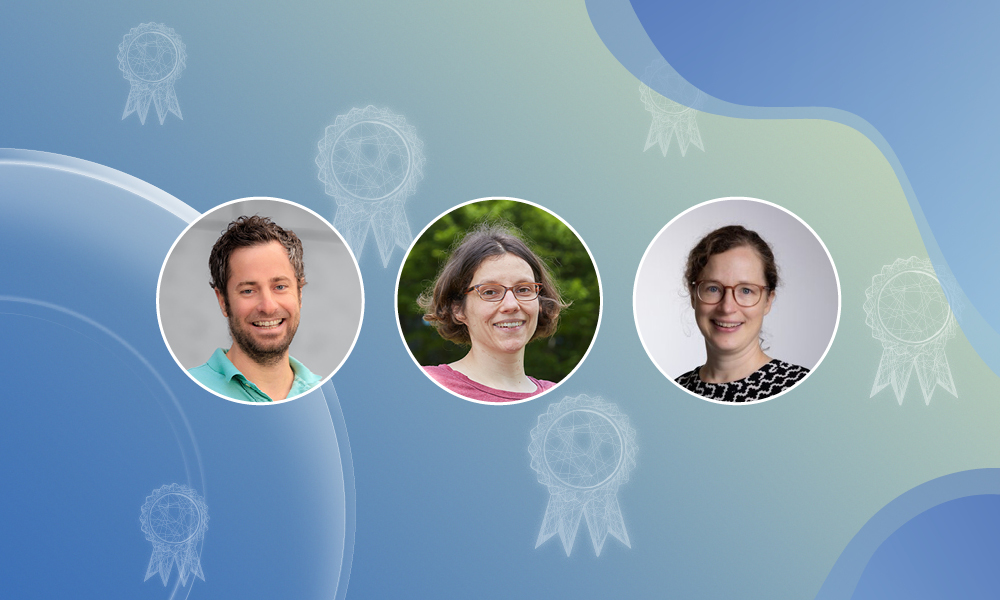
Three EMBL scientists awarded ERC Consolidator Grants
EMBL group leaders Olivier Duss, Simone Köhler, and Eva Kowalinski received ERC Consolidator Grants for their promising work on fundamental cellular mechanisms.

The European Research Council (ERC) has awarded Olivier Duss and Simone Köhler, Group Leaders at EMBL Heidelberg, and Eva Kowalinski, Group Leader and Co-chair of the Infection Biology Transversal Theme at EMBL Grenoble, prestigious ERC Consolidator Grants worth 2.6 million, 2.5 million, and 2 million EUR, respectively, to fund their innovative research projects aimed at understanding fundamental cellular mechanisms.
A real-time movie featuring how important cellular processes cooperate
All cells contain DNA, the molecule carrying the code of life. In order to encrypt this peculiar alphabet, cells first convert DNA into messenger RNA (mRNA), DNA’s sibling with different functions, in a process called transcription. Then, the information in RNA is ‘translated’ to build proteins, molecules which perform most of the activities in our busy cells. However, sometimes DNA gets damaged and needs to undergo DNA repair at the same time as it is decoded. In bacteria, all these processes occur in the same place and at the same time. Although they have been thoroughly characterised in isolation, how they work together is not well known. The Duss Group at EMBL Heidelberg tries to shed light on these crucial interactions.
As part of the ERC-funded project ‘RNP5D’, Olivier Duss’s team aims to investigate how the processes of transcription, translation, and DNA repair are functionally connected to each other in bacteria. Building on their recent work on the interactions between transcription and translation (published in Nature), they plan to combine multi-colour single-molecule fluorescence experiments, both in vitro and in living cells, with cryo-electron-tomography – an imaging technology that yields three-dimensional structural information. Using these individual structural snapshots of the three processes, the researchers plan to generate a real-time movie of the entire decoding and maintenance process of DNA.
Olivier Duss said: “We are very excited that our work, which addresses a fundamental problem in biology, was funded by the ERC. It allows us to carry on with our curiosity-driven research, for which we have a unique environment at EMBL. We appreciate that ERC and EMBL support basic research, because it ensures scientific excellence in Europe with the aim to improve human health in the long term.”
Crossing over: shaping genetic diversity during germ cell division
Sexually reproducing organisms produce special reproductive cells, called gametes, which help maintain the same number of chromosomes across generations. The mechanism of producing gametes is called meiosis and consists of a double round of cell division resulting in the generation of cells with half the number of chromosomes as their parental cells. In particular, during chromosome separation, exchange of genetic material between two copies of the same chromosome can occur – a process called ‘crossover’. Properly controlled crossover formation is essential for sexual reproduction, as errors in this process can lead to aneuploidy – an incorrect number of chromosomes – or genetic disorders. At the same time, crossovers also increase genetic diversity in future generations by shuffling genetic material, which is a key driver of evolution and adaptation.
The ERC-funded project ‘COntrol’ led by Simone Köhler at EMBL Heidelberg aims to uncover the molecular mechanisms that regulate crossover formation during meiosis.
Köhler explained: “In the last years, my group has developed imaging techniques and image analysis tools that have, for the first time, allowed us to observe crossover formation in real-time in living animals. These tools and the generous funding from the ERC will give us a unique opportunity to investigate the complex molecular mechanisms that enable germ cells to precisely control the number and distribution of crossover events, which is essential for producing healthy and diverse progeny.”
Parasite biology features unlock novel gene therapies
Trypanosoma brucei (T. brucei) is a parasitic organism that causes disease in both humans and animals worldwide, mainly through insect bites in tropical regions. As climate change may increase the spread of insect-borne diseases, understanding the biology of these parasites is becoming more urgent. In addition to its impact on human and animal health, T. brucei is also used as a model organism in research to explore the origins of eukaryotic life and evolution.
The Kowalinski Group at EMBL Grenoble focuses on the structure and function of RNA processing complexes in T. brucei. In particular, Kowalinski’s ERC-funded project titled ‘TRANSPLIC’ aims to resolve the mechanism of trans-splicing. This process is an essential step in T. brucei mRNA biogenesis in which a cellular machine called ‘spliceosome’ cuts and stitches together different RNA molecules to generate functional mRNAs. Spliceosome-mediated trans-splicing also holds promise as a molecular tool for RNA editing, a novel approach to gene therapy currently tested in a variety of clinical trials. With a combination of cutting-edge integrative structural parasitology techniques, ranging from cryo-electron microscopy – an imaging technology able to capture accurate snapshots of frozen biological samples – to advanced biochemical and cell biology methods, Kowalinski and her team aim to uncover the molecular details of Trypanosoma trans-splicing, from the atomic to the cellular level.
“I am truly honoured to receive this recognition from the ERC,” said Kowalinski. “This funding will allow my lab to focus on a fascinating fundamental research question over the next five years, with the potential to lay the groundwork for future innovations in infection biology and gene therapies. I am excited for the journey ahead and feel grateful for this opportunity.”
Olivier Duss, Simone Köhler, and Eva Kowalinski are among the 328 recipients of the ERC Consolidator Grants 2024. These grants, provided through the EU’s Horizon Europe programme, are awarded to excellent scientists to help them support their independent research teams and unleash the full potential of their innovative research projects.
Read the ERC press release here.


